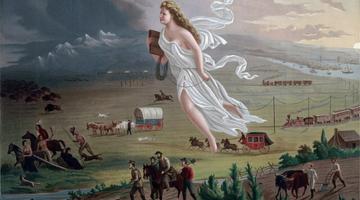What Haley crafts about the lives of incarcerated women is astounding in its archival literacy, analytical sophistication, and authorial courage.
“Haley immerses us in the daily rhythms of life.”
(In this four-week symposium, we asked authors to comment on Sarah Haley’s book, No Mercy Here: Gender, Punishment, and the Making of Jim Crow Modernity. This week’s contributor is Dan Berger. Read the first part of the symposium, by Marisa Fuentes, here, and the second part, by Jennifer Leath, here.)
“Reimagining the Archive of Imprisonment”
by Dan Berger
The prison is an archive, a vast repository of human experience.
The prison is an archive, a walled-off site whose ordering validates certain forms of knowledge at the expense of others.
The prison is an archive, a collection of state-sanctioned stories that reify acceptable truths and repress dangerous ones.
The prison is an archive, a disquieting site in which competing worldviews contend.
The prison is an archive—but it is unlike other archives. It is an archive where the epistemic violence of statecraft meshes with the physical violence of the state’s monopoly of force in stunning precision and heartbreaking scale.
The prison is an archive, and like any archive it requires competent guides to make sense of its mysteries. The prison is an archive that, like any other but perhaps more urgently so, needs to be read against the grain as much as within it.
Some of this archive’s most potent, most revelatory artifacts are not recorded on paper but must be conjured through other means. They are evident in story and song, in disruption and debate. They are event in the course-correction measures that the archive—the state, the prison, its employees—implements to prevent challenges to its authority that it dares not name.
“The prison is an archive that needs to be read against the grain.”
No Mercy Here is a book of unique brilliance. Among other reasons, the book allows us to see, understand, and reimagine the archive of imprisonment with stunning clarity. Black women prisoners of the convict lease system in nineteenth century Georgia leave few archival traces in the traditional archives of the era; perhaps the greatest silence has been the reluctance of historians to even take up the topic until recently. That Haley and Talitha LeFlouria’s respective books on the subject have garnered so many accolades between them demonstrates the necessity of such investigations when done with the exquisite, meticulous rigor each scholar has done in tackling the topic.[i]
Navigating the limits of the archive—its silences, yes, but particularly the way those silences are built in through violence both physical and epistemic—is and should be central to the emerging carceral histories.[ii] Studying imprisonment and the larger carceral state requires direct contestation with how the state crafts and curates enemies, how it makes them visible and invisible. To do that well requires a commitment to read state power critically, maybe even antagonistically, for the ways gendered racism structures political and social life. Alongside that antagonism, the carceral engaging what historian Kelly Lytle Hernandez has called “the rebel archive,” the counter-archive through which currently and formerly incarcerated people, their loved ones and advocates, make their own knowledge of punishment known through their own cultural and political work.
“The state crafts and curates enemies.”
No Mercy Here shows the mutually constitutive nature of the prison archive and the rebel archive in ways few other books on punishment have done. She renders such archives as more than parallel formations that comment on each other. Instead, they are linked dialectically and materially—what the archive does and does not record is often a matter of life, death, and imagining otherwise.
For all its power, the archive is not a static entity. It evolves, naturally; but it can also be reimagined, repurposed. And that is where Haley makes, to my mind, her greatest intervention: the speculative archive she finds within and yet just outside the bounds of the existing ones. This move is one that I hope other analysts of the carceral state will find their own ways to take up—even if, in all honesty, I doubt the confidence to do so in my own writing. Yet what Haley crafts about the lives of incarcerated women at the opening of chapter 2 is astounding in its archival literacy, analytical sophistication, and authorial courage. Entitled “Convict Leasing, (Re)Production, and Gendered Racial Terror,” the chapter provides a sustained development of “gendered racial terror” to understand Black women’s experiences with the productive and reproductive labor they were forced to do under convict lease system specifically and Jim Crow modernity generally. It tracks labor, violence, and the violence of labor across the geography of city, county, and state convict camps.
Yet it is the chapter’s opening I wish to dwell on here. She begins with a fine-grained narrative of Adeline Henderson and Nancy Morris, two Black women forced to work at the Dade County Coal Mines. With scrupulous documentation—twenty-three footnotes over four and a half pages—Haley follows their tribulations with novelistic precision. Haley immerses us in the daily rhythms of life in a prison camp to depict how human beings exist within the all-too-human cruelties of inhumane realities. Haley introduces us to some of the other women incarcerated there and to Adeline and Nancy’s respective families. We learn of their failed attempts at release and the ways the women buoyed each other’s spirits amidst the violations of their daily lives.
Haley’s extended vignette is neither saccharine nor sensationalist. It is, rather, illustrative of the prison archive: the things we know, cannot know, and can only imagine about imprisoned people. This approach, she writes, “does not remedy archival gaps or offer a redemptive reading, but instead enables a historical musing upon the emotions, ambivalences, and intimacies that might have marked their experiences in the context of overwhelming violence. Imprisoned women’s relationship with each other are mostly buried amid a much more voluminous account of the violence they endured.”[iii] This imaginative-yet-still-materialist method conjures the life of incarcerated subjects in ways the archive itself is unable to do alone. It calls on other historians to approach the study of imprisonment and other forms of violence in ways that do not reproduce their logic. One must, as Haley has so beautifully done here, analyze the processes of abjection alongside the human experience of them.
“We learn the ways the women buoyed each other’s spirits amidst the violations of their daily lives.”
This is historiography against and outside the well-worn debates of structure versus agency. Haley’s book is among a growing corpus of work that shows we should reject that binary itself. Instead, she engages something more profound that is also far closer to how people actually live within conditions not of their own choosing. The speculative conjuring and the empiricist findings, the analytical precision and the open-ended questioning collectively interrogate the archive of imprisonment. That combination provides the necessary attending to the contradictions of the archive—particularly archives of violence such as the prison. Where the archive of imprisonment shouts “criminal,” we must speak “human.” Where the archive of imprisonment silences the terror of its own creation, we must excavate the violations without succumbing to a deterministic reading of its victims and survivors. Doing so is not an insistence that “prisoners are people too” or a self-righteous plea that “we” must care about “they” who are imprisoned, as if “we” are not also intimately connected to the carceral state.[iv] The archive must be reimagined to be engaged, engaged to be reimagined.
“Where the archive of imprisonment shouts ‘criminal,’ we must speak “human.”
Haley utilizes other speculative approach to prison that I think are instructive to others studying the carceral state. The last chapter of No Mercy Here before the conclusion closes by recounting a 1900 rebellion of incarcerated women at Milledgville State Prison Farm. Emma Yates, Roxie Collier, Lethie Beech, and Mary Traylor—all Black women except for Traylor, who was white—burned down the women’s building at the prison. They failed to escape, though some other women may have. The chapter ends with a remarkable turn of events: a jury, perhaps motivated by paternalistic racist sympathy for Traylor, acquitted all four women against the testimony of the warden, the superintendent, and dozens of other Black women prisoners forced to speak in court. The rebellion and its place in the chapter is unexpected. Much of the chapter concerns the sonic sabotage Black women engaged in as well as the social bonds they formed and alternative epistemologies they shaped as part of what Haley labels “Black Radical Feminist Refusal.” It is a chapter about “fugitivity,” about the “immanent” sense of “freedom ingrained in [Black women’s] interior lives even as the external world indicated they were trapped.”[v] Haley recounts tales of friendship, fugitivity, and the freedom songs of prison walls tumbling down to be found in Black women’s blues music.
The chapter begins in 1918 and moves back and forth from the 1880s to the 1920s before concluding with the 1900 arson. Haley makes no attempt to reconcile or tidy up the mess of the prison, the mess of its archive. It is elliptical, non-linear, and open-ended. The structure of prison produces its own antagonism, against its express wishes yet with a certain inevitability, “epistemologies of refusal” that manifest alternate forms of survival, resilience, freedom.[vi] And sometimes the rebels win.
Dan Berger is an associate professor of comparative ethnic studies at the University of Washington Bothell and affiliate associate professor of history at the University of Washington Seattle. He is the author or editor of six books, including Captive Nation: Black Prison Organizing in the Civil Rights Era (UNC Press, 2014), which won the James A. Rawley Prize from the Organization of American Historians. His most recent book, coauthored with Toussaint Losier, is Rethinking the American Prison Movement (Routledge, 2017).
COMMENTS?
Please join the conversation on Black Agenda Report's Facebook page at http://facebook.com/blackagendareport
Or, you can comment by emailing us at comments@blackagendareport.com
Notes:
[i] Sarah Haley, No Mercy Here: Gender, Punishment and the Making of Jim Crow Modernity (Chapel Hill: University of North Carolina Press, 2016); Talitha LeFlouria, Chained in Silence: Black Women and Convict Labor in the New South (Chapel Hill: University of North Carolina Press, 2015).
[ii] Michel-Rolph Trouillot, Silencing the Past: Power and the Production of History (Boston: Beacon Press, 1995); Heather Ann Thompson, Blood in the Water: The Attica Prison Uprising of 1971 and Its Legacy (New York: Pantheon, 2016).
[iii] Haley, No Mercy Here, 62-63.
[iv] Dan Berger and David Stein, “The Criminalized Majority,” Black Perspectives, July 21, 2017. http://www.aaihs.org/the-criminalized-majority/
[v] Haley, No Mercy Here, 199.
[vi] Ibid, 254.



















